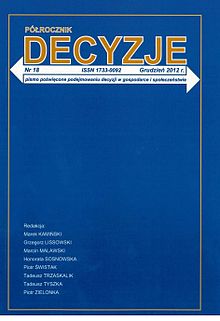Czy wnioskowanie bayesa i rozkłady sprzężone mogą tłumaczyć zjawisko iluzji kontroli
Can Conjugate Prior Probability Explain the Illusion of Control?
Author(s): Marcin Czupryna, Elzbieta Kubińska, Łukasz MarkiewiczSubject(s): Economy, Business Economy / Management, Social psychology and group interaction, Organizational Psychology, Behaviorism
Published by: Akademia Leona Koźmińskiego
Keywords: overconfidence; illusion of control; emotional and rational model; Bayesian updating; conjugate prior probability;
Summary/Abstract: In this paper, we consider the illusion of control by using Bayesian updating as the rationality model. Our paper contributes twofold. First, we empirically verify that the illusion of control may have two concurrent sources, “emotional” and “rational”. The first one produces biased Bayesian processing due to emotional engagement and the second one yields biases due to prior assumptions on the level of control. Second, we propose a method for identifying these two sources. Moreover we verified two hypotheses H1: The emotional factor causes overestimation of the actual level of control. and H2: The rational factor is responsible for the reverse relationship between observed levels of the illusion of control in three separate situations, when subjects have significant control, moderate or no control. Only the hypothesis H2 received partial empirical support.
Journal: Decyzje
- Issue Year: 2018
- Issue No: 29
- Page Range: 87-113
- Page Count: 27
- Language: English

